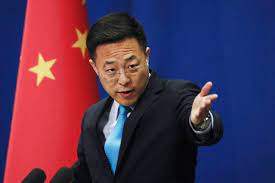By Kong Dechen
Engaged in the cross-border e-commerce business, Tang Sheng has worked on a very tight schedule in a recent couple of months.
“I sell tools on Amazon. In the first quarter this year, my business performance was poor due to the rising price of raw materials and COVID-19 resurgence in China,” he said.
Fortunately, an upsurge of orders arrived in May and June. “I’m happy though I’m kept busy,” Tang told People’s Daily.
After Amazon announced the date of its Prime Day this year, an annual deal event exclusively for the e-commerce giant’s Prime members, Tang stocked up in advance.
“I got a lot more orders this year. Ports in Guangzhou see a busy logistics,” Tang said. According to him, the shipping price has been significantly lowered, from the peak point of around 30 yuan ($4.45) to 18 yuan per kilogram. It has greatly relieved the cost pressure for foreign trade companies.
According to customs statistics, China’s foreign trade of goods jumped 9.4 percent year on year in the first half of this year. The total imports and exports in May and June grew 9.5 percent and 14.3 percent, respectively, reversing the decline in growth in April led by the COVID-19 resurgence.
The month-by-month growth signified a V-shaped rebound in China’s foreign trade and has laid a solid foundation for the whole-year performance.
Apart from the upturn, China’s foreign trade also set two new records. In the January-June period, the country’s total imports and exports of goods hit a record of over 19.8 trillion yuan. The number in June stood at over 3.7 trillion yuan, with total exports exceeding 2.2 trillion yuan, the highest monthly figures ever.
While the growth picks up, the quality of foreign trade is also improving. The proportion of general trade continues expanding, and the trade with major trading partners is on a rise. Besides, foreign trade entities have become more active and there’s a steady growth in the imports and exports of major products. As of June this year, China’s foreign trade had recorded positive growth for eight consecutive quarters.
The month-by-month growth in the total foreign trade volume came from the stable macro economy, including the robust domestic demand for production and the rapid recovery of foreign trade in certain regions of the country.
The V-shaped rebound couldn’t have been achieved without the country’s supportive policies. For instance, to ensure smooth logistics of COVID-19 vaccines, the General Administration of Customs (GAC) has launched whole-process monitoring during customs clearance and carried out advanced verification of declaration documents, so that vaccine products don’t need to be unpacked during the process and fast clearance is ensured.
“The rebound of China’s exports in May was indeed recovery growth following the pandemic,” said Huo Jianguo, vice chairman of the China Society for World Trade Organization Studies.
“It was inseparable from China’s efforts to eliminate negative factors troubling the foreign trade sector, such as opening green channels and prioritizing the shipments of foreign trade enterprises, In general, the policies to promote work resumption and straighten logistics are effective,” he explained.
Liang Ming, director of the institute of international trade at the Chinese Academy of International Trade and Economic Cooperation, a think tank of the Ministry of Commerce, told People’s Daily that promoting the stability and quality of foreign trade is a focus of China in the next phase.
While maintaining a stable size of its trade and steady share in the international market, China will improve the quality and economic benefits of foreign trade, so as to achieve high-level opening up, Liang said.
So far, the GAC has launched special campaigns and rolled out facilitation measures in 10 cities across China. It has also worked to shorten the time of customs clearance and guided more than 90,000 enterprises to apply for customs declaration registration with the streamlined method that integrates multiple procedures into one consolidated business license. It has promoted integrated reform in all services and further improved trade facilitation.
“The fundamentals sustaining China’s economic resilience, potential and long-term growth remains unchanged, and the country’s foreign trade is expected to embrace further growth,” said Li Kuiwen, spokesperson of the GAC.













